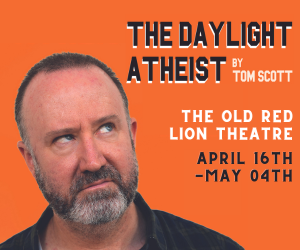Modern Life Is Rubbish is romantic comedy about a couple whose love of music brings them together as well as revealing their differences. The feature film version starring Freya Mavor and Josh Whitehouse recently made its world premiere at the Edinburgh International Film Festival, but the story started life as short stage play. Broadway Baby’s James T. Harding met playwright and screenwriter Philip Gawthorne to learn more about the film and talk about writing across stage, television, and the big screen.
The game has changed in a major way
Gawthorne found the seed for Modern Life of Rubbish in 2003, when he and some friends from the Royal Court Theatre's Young Writers Programme would meet and set each other writing exercises. One such exercise was to write something inspired by a song, in Gawthorne’s case, ‘With or Without You’ by U2, which he ‘felt had a quality which is very rare to have in a song: it's always spine tingling even when you've heard it 1237 times. That was my spark: to try and do something that captured the emotion of a relationship where you felt like you couldn't live with or without this person.’
The story ‘evolved into this exploration about music and our relationship with music as the soundtrack to our lives, particularly with relationships’ and was staged by Mind The Gap Theatre in 2008, nominated for a New York Innovative Theatre Award. Only a year later, director Daniel Jerome Gill picked up the script and turned it into a short film starring Rebecca Night and Rafe Spall.
‘When we started to get interest in the short becoming a feature,’ director Daniel Jerome Gill ‘was integral to building it. If you know there's a directer cooked in, it makes sense to include them as much as possible when you're structuring the feature script so that they feel they've got some skin in the game, their DNA in the script. The director is always going to want to put their stamp on it, so this way saves time.’
So how much of the original story made it through all these different stages to the film? ‘It's essence is very much there. What Dan did so brilliantly was make it something cinematic. This could have been two people in a house talking. He was able to open it up and think visually. It has scope and scale and swagger.’
After his time at the Royal Court, Gawthorne was selected for John York’s BBC Writers Academy. ‘When I went into that I had the arrogance of youth: you're not actually going to teach me anything about writing, come on. But within the first week I realised how little I knew and how much I had to learn. It was a very humbling experience. I'm hugely grateful.’
Of all the different script genres, popular television is the hardest ‘because of the things you can't change. You've got to hit your act breaks, have a cliffhanger before your commercial and at the end of the episode. It's just a bit more rigid. It's a very specific type of writing.’
‘It was difficult for me to express my own voice within that system, because of the nature of it.’ British shows often give very specific briefs to their episode writers, right down to what happens in their episodes.’
‘Casualty was the one that had the most scope to put your own stamp on it—you have the guest story element. I got fired because, on my first attempt, I tried to turn my episode into The Shield, which I was obsessed with at the time. It was entirely justified that I was fired. I was pretty young - this was about ten years ago - I consider it something of a badge of honour these days.’
Although much of what Gawthorne learnt as a staff writer on BBC shows was specific to those shows, ‘certain techniques are universal. One that stayed with me is having a cliffhanger at the end of every scene - it can be small.’
‘An example: Barbara Windsor in EastEnders. She gets a letter. She looks at it. She looks confused. Cut. Something as simple as that can be a cliffhanger. We were taught that every scene should have that principle.’
Gawthorne has written across theatre, television and film. ‘Ultimately, movies were my jam, what I was always about, wanted to get into, my passion, ever since I was a kid,’ but theatre ‘was a more accessible route.’
‘With the way the industry is going, it behooves you to have different skill sets. With movies shrinking and TV, content delivery like Netflix and Amazon becoming so influential, the game has changed in a major way. If you can try and do them all, do.’
Modern Life is Rubbish was recently acquired by the US distributor Cleopatra Entertainment.










